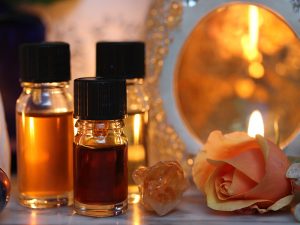- info@aromantique.co.uk
- 07419 777 451
Heather Dawn: Godfrey. P.G.C.E., B.Sc. Joint Hon) explains what essential oils can offer as a supplement to your mindfulness and meditation practices.
The article below includes excerpts from my new book, Healing with Essential Oils (working title), which is due to be published by Healing Arts Press, Inner Traditions winter/spring 2022.
 Each moment is new, a unique, fresh, opportunity, rich with possibility, with the past confined to memory; the future to imagination. Our experience of life occurs in the ‘here and now’.
Each moment is new, a unique, fresh, opportunity, rich with possibility, with the past confined to memory; the future to imagination. Our experience of life occurs in the ‘here and now’.
At the epicentre of the storm, there is calm; at the centre of chaos, stillness; at the heart of ‘being’, peace. So too, at the heart of each moment, tranquillity rests within the flow of motion.
Remaining mindfully aware, we are present and consciously engaged in the ‘here and now’. Meditation gently sustains a consciousness of ‘being’ in the moment, enabling us to stand at the centre of each moment and observe and, thus, gain a greater sense of awareness of ‘what is’.
One’s mind constantly chatters; this is its nature. It’s a very useful tool and serves an invaluable purpose, intrinsic to the ability to survive and navigate through life; it serves us well. Meditation reminds us that we are master, not the servant of our minds; we are the observer, the orchestrator. Paradoxically, though, meditation also reminds us that we are a tiny drop in the universal ocean, separate, but belonging and connected to a greater whole. Here are three pertinent quotations from the 15th century Indian mystic and poet, Kabir:
In your body is the garden of flowers.
Take your seat on the thousand petals of the lotus, and there gaze on the Infinite Beauty.God is the breath inside the breath.
It cannot be told by the words of the mouth, it cannot be written on paper, it is like a dumb person who tastes a sweet thing… how shall it be explained?
Mindfulness provides a practical tangible tool with which to draw attention to the moment. It provides structure, boundaries and guidance, a ‘road map’ of sorts. For example, focusing on the breath or on an object held steadily within the gaze and returning focus when the mind wanders helps to discipline the attention. Thoughts will wander from the present to the past or future, or perhaps dash off on imaginary tangents. But, we have choice. If we chase our minds through the metaphorical door, we leave the room and are no longer ‘present’. We miss the opportunity that meditation offers, and the experience that it yields.
Regular practice gifts the greatest benefit. The moment never offers more than we can deal with, and yet, the fruits of present-centred awareness and meditation are manifold. We can think of it as a ‘re-wilding’ of the soul. An over-ploughed, depleted field, abandoned and barren of life after years of repeatedly growing the same crop, left to its own devices, will suddenly begin to bloom again as nature magnificently reclaims its territory. In rediscovering our own magnificence, we then notice that life is full of miracles that completely outshine rain on our wedding day.
 How do essential oils support meditation?
How do essential oils support meditation?Observing the scent of essential oils we are aware of our breathing and, consequently, of the immediacy of the moment.
Beneath the surface, as we inhale essential oils they instigate a direct influence on the limbic area within the brain, also known as the ‘emotional brain’, which includes the amygdala, hippocampus, thalamus, and hypothalamus. The hypothalamus connects to the pituitary gland, the master endocrine gland, and certain chemical components within essential oils (either via chemical absorption or through instigating a neural response) will stimulate or balance hormones.
Thus, essential oils variously influence the nervous system, memory, mood and emotion. They can stimulate and uplift, sedate and calm, aid alertness, focus and concentration, and emotionally ground and inspire us. They are adaptive, and do tend to normalise or balance rather than simply stimulate or sedate.
Frankincense and patchouli slow and deepen the breath. Cedarwood instils feelings of peace. Spikenard inspires a sense of spirituality. Vetivert (the oil of tranquility) is grounding and earthing, quelling restlessness. Tea tree clears the sinuses and aids mental alertness. Rose (the queen of essential oils) balances, gently grounds and uplifts mood and emotion.
Only very small amounts of essential oils are required to procure or instigate a psycho-emotional response.
Essential Oils for Mindfulness and Meditation explains the philosophy and techniques of mindfulness as well as how essential oils are absorbed and can support meditation. Also detailed are safe and effective ways to apply essential oils for personal use, alongside information about relaxation techniques, exercise, and nutrition.